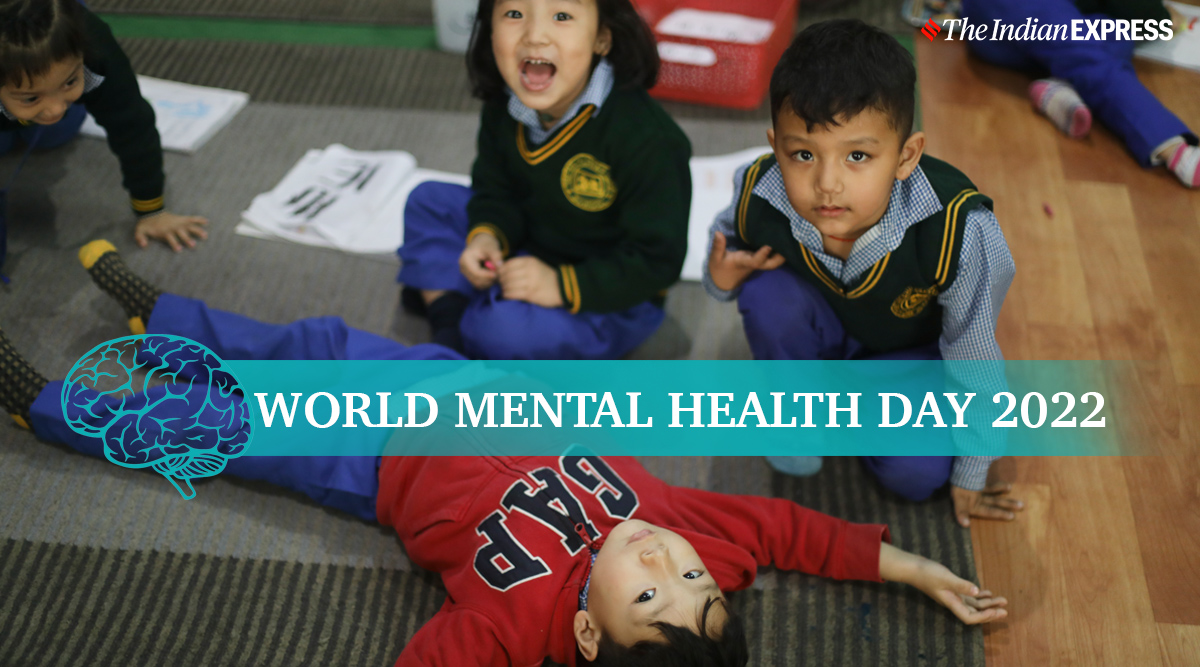world mental health day 2022: Test anxiety is quite common and can range from mild annoyance to debilitating anxiety that affects performance, mental health, and well-being. Contrary to what most of us think, test anxiety can be experienced by students of all ages.
According to a recent NCERT national survey, 81 percent of students surveyed reported that they face anxiety due to studies, tests, and results. While experiencing a certain amount of anxiety, often called “eustress,” can actually help you perform better, for some children this can become so overwhelming that it affects performance and overall mental health.
Some common signs of test anxiety include difficulty sleeping, irritability, mood swings, lack of appetite or comfort eating, increased coffee consumption, smoking, or drinking alcohol. There may also be physical symptoms like palpitations, sweating, chest pain, headache, vomiting, etc. Students also suffer from extreme anxiety prior to the announcement of results, especially when expectations are high, and this can also lead to suicidal thoughts and withdrawal.
If you are a student, remember that you can cultivate your resilience, that is, recognize your inner strengths and abilities so that you can cope and thrive with life’s normal stressors and improve your overall well-being. Here are things to keep in mind:
1. Start early – set your goals, make a plan and believe you have the ability to achieve them
Everyone may have told you to make a study schedule, but this planning needs to start early. It should include time for study and reviews. Setting your long-term goal is important, but equally important is breaking it down into short-term goals, steps that are achievable and give you a sense of accomplishment. The second thing to remember is that goals must be smart: they must be achievable and subject to deadlines. So set a time to start preparing, when to do the self-study, making sure to set a time for reviews. Prepare highlighted notes. If for some reason you have limited time for preparation, change your goals and plans, keep in mind the markscheme, start with the essential chapters; Prioritize your strongest concepts.
Simulate taking exams under the same circumstances as on the last day. Familiarity breeds self-confidence and therefore “mock tests” improve confidence and minimize uncertainty and anxiety. Discover your most effective study routine and stick to it every time you prepare for an exam. Avoid studying two to four hours before the test, as last-minute bursts can increase anxiety and even make your mind go blank during the test.
When scheduling your studies, it is important to schedule breaks. Continuous study seven days a week can cause exhaustion before the exam.
2. Become familiar with your path through anxiety: anticipate and find ways to manage your emotions
Test-induced anxiety often increases as you move toward D-Day. It helps to be aware of your emotions and find ways to deal with difficult emotions, so they don’t overwhelm you and interfere with your goals.
A helpful tip is to compartmentalize time. If you find it difficult to put aside worrying thoughts while you study, set aside “worry time.” Whenever worrying thoughts pop into your mind while you’re studying, tell yourself that you’ll put them off until ‘worry time’. This way you maximize your study time and renew your focus on achieving your goals.
Another way is to identify what makes you feel good and do it when you feel overwhelmed: take a break to listen to music, play a sport, go for a walk. Remember, experiencing difficult emotions during any stressful time is normal, the important thing is that you identify them and practice healthy ways of managing them.
3. Meditate and practice calm
Discover ways to calm your mind and body. Some helpful techniques include performing relaxation techniques such as deep, timed breathing, relaxing your muscles, and visualizing a positive outcome. Mindfulness practice is extremely helpful in dealing with anxiety.
Learn to control your negative thoughts: Test anxiety is often associated with negative thoughts of failing, poor grades, etc. Instead of going into a downward spiral, think about your strengths. Know that you have inner strengths that can help you on your exam. For example, you might identify the strength of Persistence or Creativity as your strength. Close your eyes and think about how your greatest strength can help you on tests.
4. Focus on the right nutrition and sleep
Mental health affects our physical health: how we feel affects what we do. Anxiety can make us eat and sleep too much, or not at all. Eating regular, balanced meals and drinking plenty of water ensures sustained energy and hydration. Avoid drinking soft drinks/sugar drinks or caffeinated/energy drinks, which can increase anxiety. Try to maintain a regular exercise routine. Adequate and consistent sleep increases cognition, memory, and success in the classroom.
5. Talk It Out: Identify Your Support Network
We are often hesitant to share. A simple tip is to find out who the people in your support network are. Talking to someone, sharing our feelings with parents, peers, teachers is vital: it relieves the pressure of your mind and creates space for happy thoughts. Peer support will see us help each other by setting goals together, reviewing, doing mock tests together, and cheering each other on.
But remember, if you’ve tried to manage your anxiety on your own and/or with the support of adults or peers, but still can’t manage it, talking to a counselor or psychologist might help.
(Gracy Andrew is Special Advisor and Nandita Bhatla is National Director of CorStone, an international non-profit organization)
!function(f,b,e,v,n,t,s)
{if(f.fbq)return;n=f.fbq=function(){n.callMethod?
n.callMethod.apply(n,arguments):n.queue.push(arguments)};
if(!f._fbq)f._fbq=n;n.push=n;n.loaded=!0;n.version=’2.0′;
n.queue=[];t=b.createElement(e);t.async=!0;
t.src=v;s=b.getElementsByTagName(e)[0];
s.parentNode.insertBefore(t,s)}(window, document,’script’,
‘https://connect.facebook.net/en_US/fbevents.js’);
fbq(‘init’, ‘444470064056909’);
fbq(‘track’, ‘PageView’);
.
